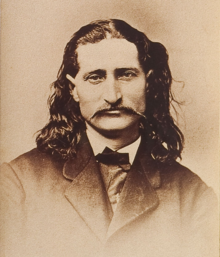Our website is made possible by displaying online advertisements to our visitors.
Please consider supporting us by disabling your ad blocker.
Wild Bill Hickok
Wild Bill Hickok | |
|---|---|
 | |
| Born | James Butler Hickok May 27, 1837 Homer, Illinois, U.S. (now Troy Grove, Illinois, U.S.) |
| Died | August 2, 1876 (aged 39) Deadwood, Dakota Territory, U.S. |
| Cause of death | Gunshot wound |
| Resting place | Mount Moriah Cemetery, Deadwood, Dakota Territory |
| Other names | James B. Hickok, J.B. Hickok, Shanghai Bill, William Hickok, William Haycock |
| Occupations | |
| Spouse |
Agnes Thatcher Lake (m. 1876) |
| Parent(s) | William Alonzo Hickok and Polly Butler |
James Butler Hickok (May 27, 1837 – August 2, 1876), better known as "Wild Bill" Hickok, was a folk hero of the American Old West known for his life on the frontier as a soldier, scout, lawman, cattle rustler, gunslinger, gambler, showman, and actor, and for his involvement in many famous gunfights. He earned a great deal of notoriety in his own time, much of it bolstered by the many outlandish and often fabricated tales he told about himself. Some contemporaneous reports of his exploits are known to be fictitious, but they remain the basis of much of his fame and reputation.
Hickok was born and raised on a farm in northern Illinois at a time when lawlessness and vigilante activity were rampant because of the influence of the "Banditti of the Prairie". Drawn to this criminal lifestyle, he headed west at age 18 as a fugitive from justice, working as a stagecoach driver and later as a lawman in the frontier territories of Kansas and Nebraska. He fought and spied for the Union Army during the American Civil War and gained publicity after the war as a scout, marksman, actor, and professional gambler. He was involved in several notable shootouts during the course of his life.
In 1876, Hickok was shot and killed while playing poker in a saloon in Deadwood, Dakota Territory (present-day South Dakota) by Jack McCall, an unsuccessful gambler. The hand of cards that he supposedly held at the time of his death has become known as the dead man's hand: two pairs; black aces and eights.
Hickok remains a popular figure of frontier history. Many historic sites and monuments commemorate his life, and he has been depicted numerous times in literature, film, and television. He is chiefly portrayed as a protagonist, although historical accounts of his actions are often controversial, and much of his career is known to have been exaggerated both by himself and by contemporary mythmakers. While Hickok claimed to have shot numerous gunmen in his lifetime, he killed only six or seven, all between 1861 and 1871 according to Joseph G. Rosa, Hickok's biographer and the foremost authority on him.[1][2]
- ^ Trimble, Marshall (April 2002). "How many men did Wild Bill Hickok actually kill?". True West Magazine. Archived from the original on April 10, 2019. Retrieved October 5, 2017.
- ^ Rosa, Joseph G. Wild Bill Hickok, Gunfighter: An Account of Hickok's Gunfights. University of Oklahoma Press; (2003). p. 198. ISBN 978-0806135359
Previous Page Next Page


